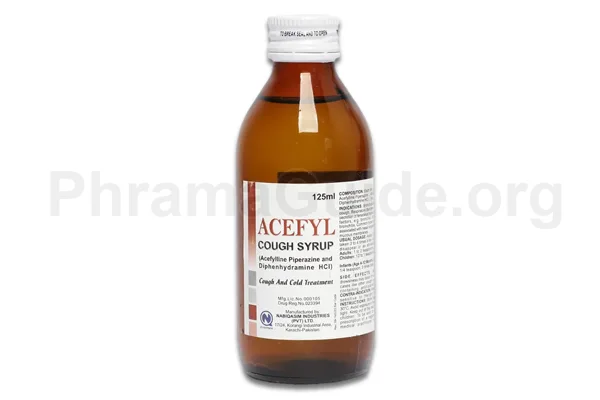Acefyl syrup is a combination medication that is used for respiratory tract issues such as cough and asthma. Using Acefyl syrup widens the airways in the lungs, making it easier to breathe. It also helps reduce allergy symptoms, such as sneezing, runny nose, and itchy eyes. The following are common uses and indications of Acefyl Syrup:
- Asthma and Bronchospasm: Acefyl syrup is used to treat conditions such as asthma and bronchospasm associated with chronic obstructive pulmonary disease (COPD).
- Cough and Cold: Acefyl is commonly used as an antitussive (cough suppressant) to alleviate cough symptoms associated with respiratory infections, common colds, or allergies. It helps reduce the urge to cough and can provide temporary relief from coughing.
- Allergic Reactions: The use of Acefyl syrup can help relieve symptoms of allergic reactions, such as sneezing, itching, runny nose, and watery eyes. It blocks the effects of histamine, a substance released during allergic responses.
Off-label Uses of Acefyl Syrup
- Chronic Obstructive Pulmonary Disease (COPD): While Acefyl Syrup is commonly used for asthma and bronchospasm, it may also be used off-label for managing symptoms of COPD. COPD is a chronic lung disease characterized by persistent airflow limitation, including conditions such as chronic bronchitis and emphysema. The bronchodilatory properties of Acefyl Syrup can help alleviate symptoms and improve lung function in some cases.
- Chronic Cough: Acefyl Syrup may be used off-label for managing chronic cough that persists for an extended period, even after other potential causes have been addressed. Using Acefyl Syrup may help reduce cough frequency and severity.
- Nasal Congestion: Acefyl Syrup, as an antihistamine, can have drying effects on nasal passages. This property may be beneficial for relieving nasal congestion associated with allergies or respiratory infections. However, it’s important to note that other specific nasal decongestants may be more commonly used for this purpose.
- Motion Sickness: Acefyl’s sedative and antiemetic properties may make it useful for managing motion sickness symptoms. Motion sickness is a condition that can occur during travel, particularly by car, boat, or plane, and is characterized by symptoms such as nausea, vomiting, dizziness, and sweating.

What is Acefyl?
Acefyl is one of the leading brands with a combination of Acefylline and Diphenhydramine in liquid form, manufactured and marketed by Nabiqasim Industries (Pvt) Ltd, Pakistan.
Acefyl Alternatives : Other Similar Brands
The following are some alternative brands of Acefyl Syrup and their manufacturers.
- Brophyl D : Stanley Pharmaceuticals (Pvt) Ltd, Pakistan.
- DAP : Nexus Pharma (Pvt) Ltd, Pakistan.
- M-Cefyl : Munawar Pharma (Pvt) Ltd, Pakistan.
- Cofsyl : Polyfine Chempharma (Pvt) Ltd, Pakistan.
Acefyl : Available Formulations and Strengths
Presently, Acefyl is available in Syrup form.
Acefyl Syrup : Acefylline Piperazine 45mg/5ml + Diphenhydramine 8mg/5ml strengths.
Who Should Not Use Acefyl?
Acefyl syrup may have certain contraindications, which are conditions or situations where its use is not recommended due to potential risks.
Hypersensitivity or Allergy: If you have a known hypersensitivity or allergy to Acefylline, Diphenhydramine, or any other components of the syrup, its use is contraindicated. Allergic reactions can range from mild skin rashes to severe symptoms such as difficulty breathing, swelling, or anaphylaxis.
Asthma Exacerbation: If you have a history of severe asthma or have experienced asthma exacerbations or bronchospasms in the past as a result of using Acefyl or similar syrup, should avoid it or used it with caution under close medical supervision.
Glaucoma: Acefyl syrup contains Diphenhydramine can potentially increase intraocular pressure and worsen symptoms in individuals with glaucoma, a condition characterized by increased pressure within the eye. Therefore, caution is advised, and the use of the syrup should be discussed with an ophthalmologist.
Prostatic Hypertrophy: Acefyl also has anticholinergic properties that can lead to urinary retention in individuals with prostatic hypertrophy, a condition characterized by an enlarged prostate gland. It is generally advised to avoid or use with caution in such cases.
Severe Liver or Kidney Impairment: Acefyl syrup metabolism and elimination may be affected in individuals with severe liver or kidney impairment. Therefore, caution is advised, and dosage adjustments or alternative medications may be necessary. Close monitoring by a healthcare professional is essential.
What is the Recommended Daily Dosage of Acefyl?
Acefyl Dose for Adults:
- One tablespoon, three times a day.
How Acefyl Syrup Works?
The mode of action of Acefyl is as follows:
- Acefylline (Theophylline): Acefylline is a bronchodilator that belongs to the xanthine class of drugs. It works by relaxing and widening the airways in the lungs. It achieves this by inhibiting the enzyme phosphodiesterase, which leads to increased levels of cyclic adenosine monophosphate (cAMP). Elevated cAMP levels result in the relaxation of the smooth muscles surrounding the airways, leading to bronchodilation and improved airflow.
Additionally, acefylline has other effects such as reducing airway inflammation, improving respiratory muscle function, and stimulating the central nervous system to increase respiratory drive.
- Diphenhydramine: Diphenhydramine is an antihistamine that primarily blocks the effects of histamine, a chemical released during allergic reactions. By blocking histamine receptors, diphenhydramine reduces the symptoms associated with histamine release, including itching, sneezing, runny nose, and watery eyes. This makes it effective in alleviating allergic reactions and relieving symptoms related to allergies or colds.

Leave A Comment